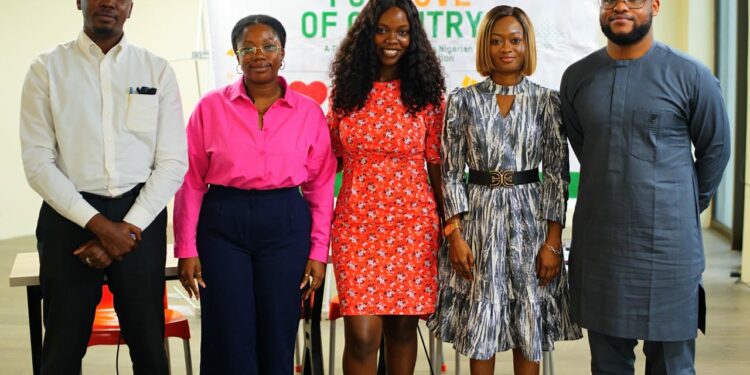Increased consideration for youth involvement in nation-building has been identified as crucial to preserving Nigeria’s future. This notion was emphasised by various experts at an Oxfam-Work in Progress (WiP) hosted hybrid town hall event, “For Love of Country?” on Monday, August 21st, 2023.
The event, which brought together diverse stakeholders through the Being Young in Naija (BYIN) campaign, is part of Oxfam’s annual celebration of International Youth Day. It featured timely conversations on increasing youth participation in civic engagement beyond electoral cycles. It also highlighted the need to harness one of Nigeria’s Most prominent resources, its teeming youth population, to salvage its status as a continental champion.
The event, held six months after Nigeria’s 2023 general elections, also sought to amplify the voices of a cross-section of Nigerian youth keen to speak on their challenges and experiences of civic participation from their various perspectives.
Work in Progress Project Coordinator Princewill Ogbodo, represented by Oxfam Communications Manager Maxwell Osarenkhoe, opened the event and emphasised dedication to facilitating youth participation in nation-building and his firm belief in the immense potential of the young generation. He further highlighted the ‘For Love of Country?’ town hall event was a testament to Oxfam’s commitment to catalysing the active participation of youths in shaping Nigeria’s future.
“I am excited to extend a warm welcome as we embark on the third and final phase of our ‘Work in Progress’ project here in Nigeria, focusing on youth-centred civic inclusion, a pivotal aspect of our initiative. This impactful endeavour has spanned across three African nations and encompasses four states within Nigeria,” he said.
He also explained that the BYIN campaign is an integral aspect of the WiP Project and enables young Nigerians to candidly share their experiences, navigate challenges, and explore opportunities.
Peter Akinnusi, speaking on behalf of the BYIN campaign team, emphasised the significance of the Town Hall event as a pivotal intersection of youth conversations adding that the active involvement of young people in governance and nation-building is imperative as Nigerian youths possess the power to shape the nation’s trajectory via leveraging not just their sheer strength in numbers but their various skills passionately.
“The primary objective of this project is to amplify the voices of the youth in Nigeria and document the challenges and experiences young individuals face in their journey of civic participation. We also sought to deliberate on viable pathways for progression through constructive dialogue. By doing so, we aspire to foster an environment where Nigerian youth not only anticipate positive change but actively contribute to its realisation,” he said.
Featuring a panel comprised of young individuals, including Kimberly Nwachukwu of Nigeria Info FM, Afolabi Adekaiyaoja of Centre for Democracy & Development, Abiye Briggs of PVC Activism, and Solape Sonuga of ElectHER conversations revolved around crucial subjects for Nigerian youth, including electoral priorities, civic participation, effective engagement with the Nigerian government, and future strategies leading to upcoming elections.
Highlighting the role of the media in advocacy and keeping the public informed of facts, Nwachukwu stressed the need for young Nigerians to demand accountability from their leaders and the press. “The importance of ethical journalism in youth advocacy is paramount, as it serves a crucial role in countering the misinformation and disinformation that often distort the narrative of these influential youth movements,” she said.
Briggs, the driving force behind the Campus Civic Summit, passionately advocated for integrating civic education as a fundamental means of nurturing an understanding of civic responsibilities among youths, insisting that promoting civic education, especially among university students, is paramount as they represent the future of youth advocacy in Nigeria.
Sonuga spoke to a growing need to facilitate more enabling environments for women to participate in political processes. She highlighted the current makeup of Nigeria’s Senate had only three senators from 109, as a microcosm of a more significant problem of the exclusion of women.
“Nigeria still doesn’t make it easy for women to contest for and hold elective positions. Religious and cultural contexts are largely held nationwide and have informed many of the stances the bulk of society hold towards women and leadership positions,” she stressed.
Speaking about the need for young Nigerians to clarify their interests during elections, Adekaiyaoja stressed the need for unity of purpose amongst youth, insisting on the necessity of grassroots mobilisation.
“Young people need to pay attention to the needs of others, building and growing communities that enable us to get involved with civic processes. This includes being part of political party systems, being aware of political processes around us and ignoring attempts to incite ethnic divides by bad faith actors,” he said.
In his concluding statements, Osanrokhoe conveyed his heartfelt appreciation to Nigerian youth and encouraged them to remain focused on building and engaging systems that could adequately cater to their unique needs and expectations.
“This event is a call to action, urging us, the youth, to channel our energies and resources into creating the Nigeria we envision.”



